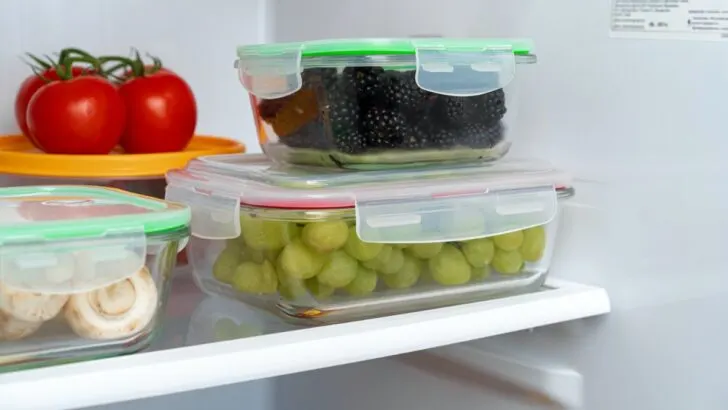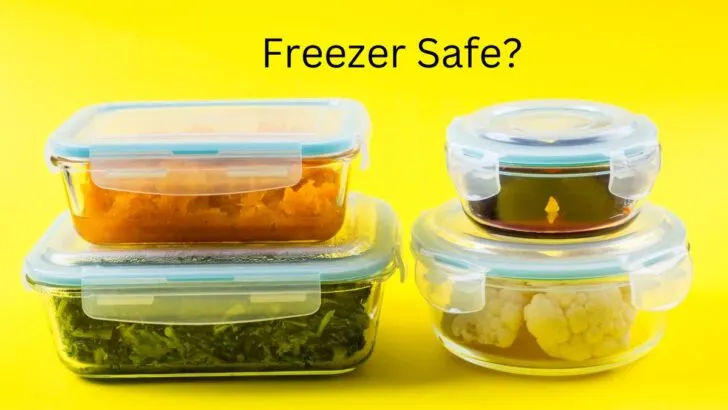Using glass containers looks so much more refined than plastic containers.
When you store food in the glass containers, you can easily see through the glass to keep good track of what you have on hand.
But can you use glass to store food in a freezer?
Glass containers are freezer safe. However, when you pull a frozen glass container out from the freezer, do not place it in the microwave or fill it with boiling water, as this could cause the glass to shatter.
Before you place the lid on the glass container or jar and store it in the freezer, wipe the area around the rim of the glass and the rim.
If there is any liquid around the rim of the glass, the liquid will freeze and it will be impossible to open the container or jar.
When you store glass containers in the freezer, place frozen bagged food around each jar. Placing bagged food around the jar will prevent the jar from knocking against each other.
Are Glass Containers Freezer Safe?
Plastic containers are convenient and lightweight, but they are not as secure as glass jars.
Glass containers are freezer safe. The freezing temperatures will not make the glass brittle, but you must be gentler with glass containers than with plastic containers.
As long as you are careful, glass containers can be stored in the freezer for years.
When using glass containers for freezer storage, do not use thin glass. It is better to use thick mason jar glasses or pickling jar glasses.
Do not store glass in the freezer if it is not designed for food storage. Glass that is not made for food storage will become brittle in the freezer.
What To Do When Storing Glass Containers in the Freezer
Before placing the glass container in the freezer, wipe the outside and remove any moisture. The outside of the glass should be completely dry.
Be sure to wipe any moisture or food off of the lid and off the rim of the glass.
If you do not wipe the rim of the glass and there is food around the rim, the moisture from the food will freeze the lid in place and you will not be able to open the lid right when you pull the glass jar out of the freezer.
When you remove the glass container from the freezer, don’t run the body of the jar over hot water. Pouring hot water could cause the jar to shatter and crack.
If you can’t open the lid of the jar, then hold the jar on its side and pour warm water directly onto the lid.
Do not expose the frozen glass to heat. If you need to microwave the contents of the jar, then let the jar sit out on the counter for ten minutes or until the glass reaches room temperature.
When you microwave the jar, remove the lid first.

Why You Should Store Food in Glass Containers
Many of us use plastic food containers to store our food. We either keep the food on our countertops, in our covers, in the refrigerator, or in our freezer.
We’ve all been doing this for years and we’ve never given it a second thought!
When it comes to plastic containers, the only real concern we have is losing the lid or the plastic container melting in the microwave.
But what if I told you there is a hidden danger in most plastic containers that you need to learn about?
There are chemicals in plastic containers that can contaminate our food. When these chemicals contaminate food, the flavor does not change. We would never know that these chemicals are in our food.
The act of chemicals from a plastic container contaminating the food in the container is known as leaching. Chemical leaching is a genuine concern and more consumers need to learn about it!
There are many chemicals in plastic containers in plastic woods, but the most dangerous chemical to be aware of is BPA.
BPA, also known as Bisphenol A, has been linked to certain health issues, brain and prostate issues, as well as other health issues.
BPA exposure is especially bad for newborn babies, fetuses, and pregnant women. BPA exposure is also linked to diabetes and high blood pressure.
If you have containers that still have BPA in them, throw them out and purchase glass containers. Glass containers are heavier and they will break when someone drops them on the floor.
Chemical leaching never happens with glass containers, so they are safer to use for food storage.
Pros and Cons of Using Glass Containers
Pros
- Easier to Recycle – Recycling is one way to reuse materials and prevent waste. Glass has always been one of the easiest materials to recycle. Plastic is also recyclable, but it takes more resources and energy to break it down and recycle it.
- Won’t Wear Out – Glass containers aren’t known for wearing out, melting, or breaking down. If you have a glass container, it will remain as durable in 20 years as the first day you bought it.
- See Into Container Easily – You can use a glass container repeatedly and the glass will never become cloudy. You cannot say the same for plastic containers. Some plastic containers are cloudy to begin with, while other plastic containers will become cloudier and with use. But you can store spaghetti in a glass container for years and once you wash out the spaghetti sauce, the glass will look brand new.
- Won’t Melt in Microwave – There are a few types of glass containers that cannot go in the microwave. But if a glass container is designed to store food, then it should be able to go into the microwave. Be warned though, glass containers retain heat well. Remove the glass container from the microwave or from the oven with an oven mitt.
Cons
- Heavy – Many people dislike using glass containers because of how heavy they are. Also, glass containers are a pain to store and move. If you were to take a glass container and a plastic container of the same size, the glass container could easily be 3 to 4 times heavier.
- Will Shatter if Dropped – Glass containers won’t always shatter when they are dropped, but they are likely to break, develop a crack, or split in half. I’ve never heard of a food container breaking after it is dropped. Plastic containers are known for melting in the microwave instead.
- Expensive – Individually, glass containers are more expensive than plastic containers. Some stores are likely to have several plastic containers for $1. But it is rare to find a glass jar that is less than $2.49. However, if you have a jar of pickles, eat the pickles and save the glass jar. Try to find more foods that come in glass containers so you can see the plastic jar for later.
Conclusion to Freezing Glass Containers
As long as you don’t pour hot water onto a frozen glass container, it is perfectly safe to use glass containers to store food in the freezer.
Do not let the glass containers bang against each other or they could break. Only use thick mason jars and never use glass jars that are not made for food storage.
Be sure to wipe around the rim so that food and moisture do not freeze the lid to the jar.


